
|
|||||||||||||||||||||||

Custom Search
|
|
 |
|
An activist once declared that “the educational system was structured to carry out a political agenda,” and, judging by recent history, it sure seems so. The statistics are unapproachable. Grimier, is the reality that encloses them. No one with a functioning conscience can deny it: Black children have been violated by the school system. They are being victimized in every way imaginable. And let it be clearly understood that those statistics are not a delineator of their incompetence, but rather, an indictment of a system that is, in its very nature, incapable of educating them adequately and appropriately. The school system has made clear its mission, and it goes without saying that this mission never considered (still doesn’t) the future of Black children as attention-worthy. What we have in return, is a neo-colonizing of the educational process, where the dreams and aspirations of Black children are bought and sold on the auction block of standardized testing. To a considerate degree, this scheme has found success. The underperformance of Black students on state-sponsored tests is championed, by many, as emblematic of intellectual deficiency. Black children: dumb, White children: smart. In essence, the bell curve is validated in perpetuity. But, behind this veil lies the truth - a sobering one: Those tests were never meant to assess academic proficiency. No. They were constructed to separate the wheat from the chaff. And in this instance, Black students are being sifted away from their futures by a racist straining device - the school system. Unless we begin challenging those dogmas that sustain this device, the violence will continue unabated. A black child, walking into a classroom at the early age of five, soon comes to realize the truth about his/her function in the educational system. At Kindergarten, this function is actualized. The child notices a difference shared with the other children of lighter complexion. They - the White ones - are more advanced, and have already found their niche in the classroom. But the Black child is still lost in this unknown universe. This strange environment. Naturally (and logically), the narrative of inferiority becomes personalized - even at such young an age. The Black child is unable to piece together this puzzle, but doesn’t fail to notice how out of sync from the rhythm of education he/she is. What the Black child knows, however, is that his/her peers were introduced to a form of education that pre-dates their enrollment in Kindergarten. This prior engagement could be the demarcating line between success and failure, for many Black children. Because universal crèche programs are still a non-reality, Black children are largely left out, at the start of the race, but still expected to catch-up, somehow. The lack of Preschool education becomes their first introduction to a world dictated by privilege and prowess. This is victimization, and nothing else.
At a time when the young Black generation’s future is hung on a tight rope, administrators couldn’t appear less concerned. To save money and cut costs, unfathomable practices are being employed by school board members. Quality educational resources are presented as luxuries (consequently, falling victim to the accountant’s sword), but security apparatuses always find refuge in the budget. They don’t mind that a complaint of short change inevitably leads to the short-changing of their students - predominantly Black and Brown. The school system shares no unease that these schemes to make financial ends meet, end up with more and more children left behind. Resources might be hard to come by, in these economic times, but many bureaucratic-minded superintendents have found comfort in that excuse, to fire teachers, replace principals, cut programs, reduce benefits, enforce regimental practices, and dismantle the vision of public schooling. Teachers who lack the skill, patience, cultural awareness, and spiritual determination to imbue greatness into students, especially the Black ones, are filling up classrooms, across the country. Unable to effectively communicate with their students, many White teachers resort to tactics learned by watching such Television shows such as COPS. Their Black students are transformed into criminals - in need of prosecution and reformation. The fact that these practices, in the words of 19th century philosopher Ralph Waldo Emerson, “sacrifice the genius” of students, unsuccessfully permeate the conscience of frustrated White instructors. These pedagogical models, Emerson explained, obliterates “[their] unknown possibilities.”
Courtesy
of the current Secretary of Education, Arne Duncan, inner-city
public schools in the windy city underwent a radical overhaul
- for worse. Whilst CEO of Chicago’s public schools, Arne Duncan
and his army of corporate solicitors successfully invaded these
facilities. Black children are not stupid, or reckless, or dangerous, or criminal-minded. They are simply, in Nina Simone’s words, misunderstood. The wrongful diagnosis of excitement as hyper-activity, hence, Ritalin-worthy or discipline-deserving, has committed grave injustices in Black homes, for decades. By rendering Black students, at first contact, intellectually-challenged, and subjecting them to Special-Ed classes, or holding them back, an assault on their integrity is struck. This practice of classifying Black students as “other,” or “unfit,” or “challenged,” or “troublesome,” or “dangerous,” or “erratic,” has created a pattern many teachers now follow thoughtlessly. After all, it is less tiring to dismiss a student as nonchalant, than to question the Eurocentric educational models most instructors are taught - and forced - to adhere to.
In his lectures on Education, Emerson poignantly outlined the fundamental qualities of genuine, student-centered pedagogy:
To respect the child, one must first know the child - Emerson understood that. And most teachers don’t - care to - know Black children. They would rather rely on stereotypes than engage their students critically. For decades now, Black children have suffered the brutal violence of a tyrannical system, and the possibility of recovery can only come through the efforts of progressive educators, activists, parents, community-members, theologians, ethicists, and concerned citizens. -
Of such is Cristin Noesen, an educator living in
Those who use this excuse to perpetuate notions of skin-defined inferiority are simply fraudulent in their ambitions, Noesen contends. Black children are not deficient, she insists, they simply draw strength from a “different cultural knowledge.” - If Black students respond more favorably to texts that engage them on a cultural parallel, why aren’t good-natured educators following suit? Noesen explains that it requires “will, determination and energy,” to bring these non-canonized “literature into the classroom.” She adds that there is a system in place which is not readily responsive to those requests.
- Noesen longs for the day when “education [becomes] much more fluid.” For that to happen, it has to change “from the didactic,” to a format where students are the drivers of their own intellectual vehicles. Teachers must shift the emphasis from memorization of “certain facts,” and do away with the “scripts” with which they are told to instruct students. The obsession with standardized tests must also cease, Noesen adds. As she sees it, “real education” is achieved when students are provided with the “knowledge to critique” their surrounding, and can better relate with the world outside their reach. Teachers, if they are to effectively reach Black children, must value the conscience of their students above the intimidation that usually follows any progressive shift in pedagogical practice, Noesen believes. In place of a “war on drugs,” she prescribes a “war on ignorance.” In her words, there has to be a “full-front attack” on illiteracy. In addition to working toward a day when that vision becomes a reality, she is also focused on getting her Master’s degree in education. Because of educators like Cristin Noesen, Black children have a future worth counting on. However, the number of those fighting on the other side far outweighs that on our side. Their arsenal is larger, and their drive, judging by recent history, blows ours to smithereens. But our history has no shortage of David and Goliath folktales, and once again, David will conquer Goliath - if we have the fortitude and determination to win the battle. This is Part 1 of a three-part series titled, “Education and the Future of Black Children.” Click here to read any of the commentaries in this series. BlackCommentator.com Columnist, Tolu Olorunda, is an activist/writer and a Nigerian immigrant. Click here to reach Mr. Olorunda. |
|
Any BlackCommentator.com article may be re-printed so long as it is re-printed in its entirety and full credit given to the author and www.BlackCommentator.com. If the re-print is on the Internet we additionally request a link back to the original piece on our Website. Your comments are always welcome. eMail re-print notice
If you send us an eMail message we may publish all or part of it, unless you tell us it is not for publication. You may also request that we withhold your name. Thank you very much for your readership. |
|
| |
|
| April
23 , 2009 Issue 321 |
|
| Executive Editor: Bill Fletcher, Jr. |
| Managing Editor: Nancy Littlefield |
| Publisher: Peter Gamble |
| Est. April 5, 2002 |
Printer Friendly Version
in resizeable plain
text format or pdf
format. |
| Frequently Asked Questions |
 |

|
 |
 |
 |
| |
| |




























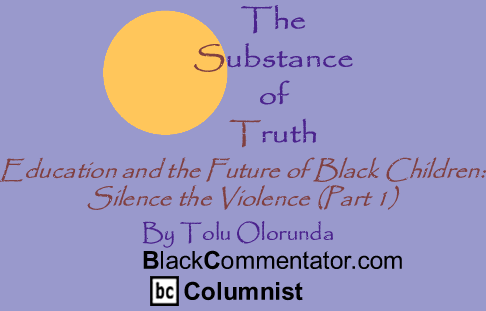


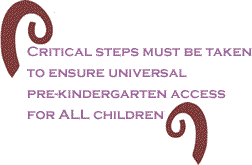 Preschools
make a great difference in early childhood education. What should
result as a transition, is usually first confrontation, for Black
children. This setback is vastly overlooked by educators, as though
it matters not. A Black child is the blind man whose sight is
cured, but, at risk of reversal, forced to become familiar, within
24 hours, with the vast volume of space that stares back at him.
Most would agree that his plight shouldn’t count against him,
but the same conscionable observers fail to see the parallel in
Black public education. Black children are the victims, not the
violators. It is criminal, as Malcolm might have put it, to request
of them something they were never equipped to produce. If the
gap is to be bridged, and equitable education for all children
is to realize itself, critical steps must be taken to ensure universal
pre-kindergarten access for ALL children.
Preschools
make a great difference in early childhood education. What should
result as a transition, is usually first confrontation, for Black
children. This setback is vastly overlooked by educators, as though
it matters not. A Black child is the blind man whose sight is
cured, but, at risk of reversal, forced to become familiar, within
24 hours, with the vast volume of space that stares back at him.
Most would agree that his plight shouldn’t count against him,
but the same conscionable observers fail to see the parallel in
Black public education. Black children are the victims, not the
violators. It is criminal, as Malcolm might have put it, to request
of them something they were never equipped to produce. If the
gap is to be bridged, and equitable education for all children
is to realize itself, critical steps must be taken to ensure universal
pre-kindergarten access for ALL children.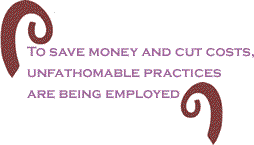 Regrettably,
the lesson drawn from these experiences is that Black children
are unfit to learn, and drastic action must be taken to make right
their inherent wrongness. To simplify it, Black children
need discipline, and whatever “measure” can instill this value
must be instituted, at once! The urgency of discipline, as they
see it, overrides the potential hazards those “measures” might
cause. Many of these teachers, administrators, and superintendents
have sought out militarization as a worthy “measure,” for the
institution of order and structure in inner-city
public schools. In the last 8 years, a huge chunk of
Regrettably,
the lesson drawn from these experiences is that Black children
are unfit to learn, and drastic action must be taken to make right
their inherent wrongness. To simplify it, Black children
need discipline, and whatever “measure” can instill this value
must be instituted, at once! The urgency of discipline, as they
see it, overrides the potential hazards those “measures” might
cause. Many of these teachers, administrators, and superintendents
have sought out militarization as a worthy “measure,” for the
institution of order and structure in inner-city
public schools. In the last 8 years, a huge chunk of 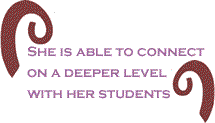
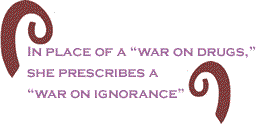 -
Paulo Freire’s doctrine of empowering students through love immediately
caught Noesen’s attention. Unfortunately, this concept is largely
perceived as “radical,” within school circles. To create an avenue
where ideas like that presented by Paulo Freire are accepted,
principals, administrators, and school board members must be pushed,
she advises. In addition, they should be “shown research” conducted
by Afrocentric scholars, who present non-conformist views for
the education of Black children.
-
Paulo Freire’s doctrine of empowering students through love immediately
caught Noesen’s attention. Unfortunately, this concept is largely
perceived as “radical,” within school circles. To create an avenue
where ideas like that presented by Paulo Freire are accepted,
principals, administrators, and school board members must be pushed,
she advises. In addition, they should be “shown research” conducted
by Afrocentric scholars, who present non-conformist views for
the education of Black children.






